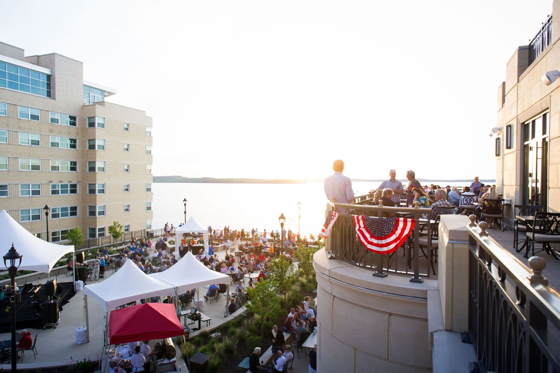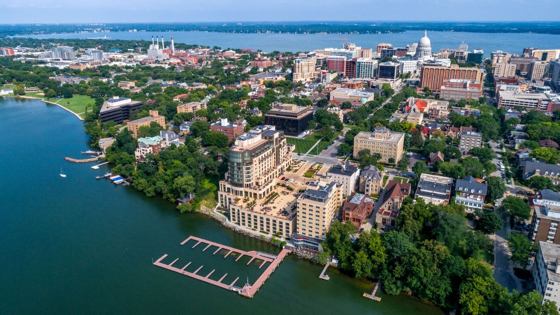Located on the shores of Lake Mendota in Madison, Wisconsin, The Edgewater Resort had for decades been a “hub for Madison society,” says Amy Supple, senior vice president and chief operating officer. In the 1940s, for instance, the hotel would host Jimmy Dorsey, Woody Herman and other big bands.
Contributed by Karen Kroll
Over the years, the luster faded. Then in 2012, Edgewater Hotel Management Co. purchased the property and spent two years and US$100 million renovating it. One goal: creating a public space at the property’s center, so that anyone, guest or not, could enjoy the lakefront.
To that end, the ballroom moved to a new building and was replaced with a plaza that looks out to the lake. The plaza, pier, and a public parking ramp ate up about US$16 million dollars of the renovation budget. “We set out to create a place that was part of the Madison community,” Supple says.

The renovation also added about 100 guest rooms, roughly doubling the initial number. Several restaurants were added, as well.
Ahead of the curve
A key component of the renovation’s success is its emphasis on programming – now a very hot topic for hotelier trying to activate and monetize public spaces. The Edgewater hosts 90 to 120 events each year. A three-day winter festival, Frozen Assets, for instance, includes a fat-tire bike race around the lake, performances on the ice, and curling demonstrations. “It’s become a marquee event for the winters here in Madison,” Supple says.
On Tuesday nights in the summer, Edgewater hosts Movies on the Water. The movies start at sunset, and the restaurant see a surge in business beforehand, “We wouldn’t see that business on a Tuesday night but for the programming,” Supple says.
Other summer events include a Memorial Day concert experience; Brewgrass Fridays, a mix of bluegrass music and the traditional Wisconsin Fish Fry; and festivals for July Fourth and Labor Day. In the fall, Edgewater hosts tailgate parties before the University of Wisconsin Badgers play football.
The programs bring between 15,000 and 20,000 people to The Edgewater each year and boost food and beverage revenue by 25% to 30%. Several attributes are critical to effective programming, Supple says. “There’s almost a formula to making public programming work,” she says.
One is the length of an event. If it stops at an hour, many people leave without making a purchase. Extend the time to two or three hours, and they’re more likely to spend money on food or drinks.
The Fourth Fest, for instance, includes kids games, a water ski show, and music. People spend the afternoon, and many end up eating and drinking, Supple says.

Another challenge is balancing competing interests within the hotel. The Edgewater’s sales department actively sells banquets, weddings and other traditional hotel functions. They compete for space and employees with the programs.
To address this, management assesses each event’s impact on the hotel’s overall performance. The Edgewater used to host live concerts on Saturday nights. They were popular, but management determined it would make more sense to keep those nights open and focus on signature events like the Fourth Fest, Supple says.
As a result, The Edgewater is able to host 80-plus weddings and events annually, along with its programming. “It’s taken a couple years to figure out the formula of how those two things work together,” Supple says.
Along with boosting food and beverage revenue, another goal is increasing occupancy rates. To that end, the hotel creates room packages around many of its events. Frozen Assets, for instance, attracts about 6,000 people from around the region, some of whom need hotel rooms. Moreover, that’s in February in cold, snowy Wisconsin—not a particularly busy time for most hotels in the area.
In the end, the goal is to create a place that people think of for weddings, dinner parties and traditional events, as well as for programs. “We view this as so much more than a hotel,” Supple says. “It’s really a mixed-use property that has a hotel and other components to it.”
